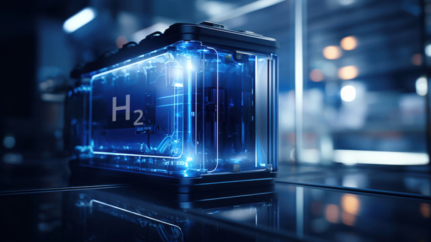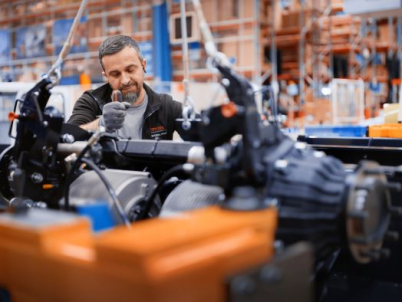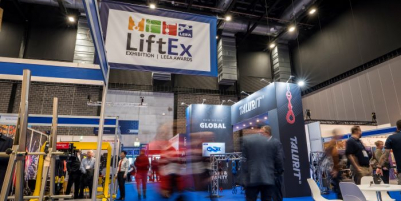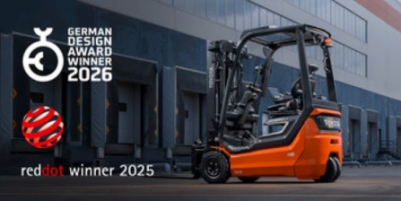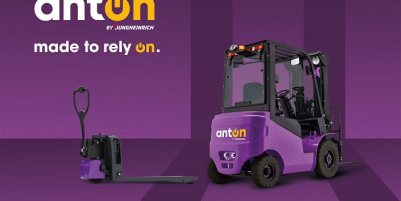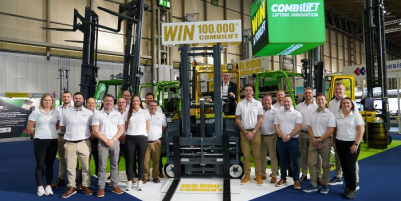-
Rite-Hite unveils new range of hydraulic kits to upgrade and extend dock leveller performance - 2 days ago
-
REWE and Cimcorp automate fresh supply chain for Berlin supermarkets and stores - 2 days ago
-
Q1 – A recovery period or time to fix, switch and scale? - 2 days ago
-
NULOGY’S SHOP FLOOR SOFTWARE TO POWER COMPLETE CO-PACKING’SOPERATIONS - February 13, 2026
-
Why lead generation depends upon good content - February 13, 2026
-
Wallapop and Albatross Sign Strategic Partnership to Bring Real-Time AI Discovery to the Future of Consumer-to-Consumer Commerce - February 12, 2026
-
Thorworld ramp helps Hubergroup to streamline its unloading operation - February 6, 2026
-
TRACKER INNOVATION FROM QUECLINK TO BOOST STOLEN VEHICLE RECOVERY PERFORMANCE - February 4, 2026
-
Flexi Narrow Aisle hits 50! - January 29, 2026
-
DERRY BROS ATTRACTS RECORD NUMBERS OF FREIGHT CUSTOMERS SEEKING CUSTOMS SUPPORT - January 29, 2026
According to Toyota Material Handling (UK) as fossil fuels are phased out and the electrification of road transport and materials handling fleets gathers pace, energy storage will become one of the biggest challenges facing companies in the supply chain sector.
Electricity is transmitted to businesses across the United Kingdom through the network of pylons, overhead lines, cables, and substations owned and maintained by the National Grid.
But, because sustainable energy sources – such as solar and wind – cannot be relied upon to provide a predictable power supply thanks to variations in weather patterns, new solutions are needed that will allow energy to be stored in sufficient quantity to sustain a constant electricity supply and avoid the risk of power cuts.
In its recently published report ‘Trends in Logistics 2024’, Toyota say that batteries capable of storing energy at very high capacities have a vital part to play in the UK’s future energy infrastructure. Potentially, Toyota contend, batteries may have to be able to store enough energy to run entire industrial sites or even to power cities or large urban conurbations.
“There is no doubt that high-capacity batteries will become a part of the overall energy landscape,” says Gary Ison, Toyota Material Handling’s Product Development Manager.
He continues: “Battery manufacturers and OEMs are in a race to develop high capacity batteries that are not only capable of powering electric vehicles, such as forklifts, over a sustained period after the briefest recharging time, but are also big enough to store the energy generated by the sun and the wind to allow essential electricity supplies to be maintained at times when the sun isn’t shining and the wind isn’t blowing.”
Battery technology is advancing rapidly with the potential of silicone, graphene and sodium batteries all being considered. And Toyota’s ‘Trends in Logistics 2024’ report says there is growing optimism that developments in solid state batteries, could have a positive long-term impact.
Solid state batteries operate the same way as any other battery. They take energy in, store it, and release the power on demand. But unlike, for example lithium-ion batteries which have a liquid electrolyte solution sandwiched in between their cathodes and anodes, solid state batteries use solid electrolytes. This increases density and means that the capacity of a solid-state battery can be up to 10 times that of a lithium-ion unit of the same size.
One potential drawback of these solid-state batteries is that they are expensive and difficult to produce and are expected to remain so for some time, so it seems unlikely that they will be seen in common usage soon.
There is also a growing enthusiasm among operators of larger materials handling equipment fleets for alternative fuels such as hydrotreated vegetable oil (HVO) and hydrogen technology.
Several models in the Toyota MHE range are offered with hydrogen fuel cells and Toyota Hydrogen fuel cell-powered forklifts already operate at sites across the Nordic region, Europe, and Australia. While in the automotive sector Toyota is at the forefront of the development of cars that use hydrogen fuel cells to deliver zero-emissions driving with long travel times between top-ups.
Existing and prospective Toyota customers can visit the Beyond Zero Experience Centre in Derby to see the hydrogen products in action, test drive various models and learn about refuelling regimes.
“For forklift truck users that have the benefit of an on-site hydrogen supply, hydrogen fuel cells can be refuelled in just a few minutes and allow emission-free operation,” says Toyota’s Gary Ison.
He adds: “Transitioning to new sustainable energy sources is one of the most significant issues facing the supply chain sector. And while the move from internal combustion engines to electric vehicles across the industry is advanced, concerns regarding grid capacity and availability of electricity generated by renewable sources haven’t yet disappeared. These concerns are causing some companies to delay investment in new technology and, ultimately, risk undermining efforts to turn the UK’s net zero ambitions into reality.” Toyota’s ‘Trends in Logistics 2024’ report can be downloaded at no cost by visiting https://tinyurl.com/25fdk4h7




























